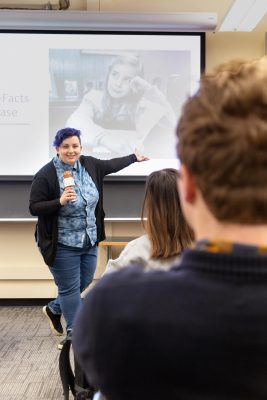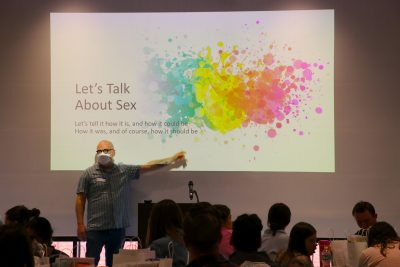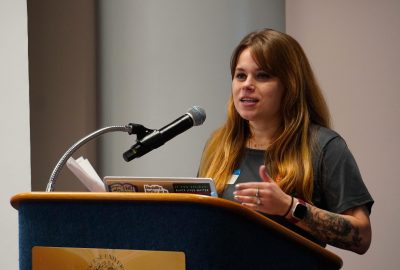Many high school students with intellectual and developmental disabilities (IDD) are excluded from schools’ sex education curriculum. Receiving little to no guidance on healthy relationships, consent, self-pleasure, and how to report unwanted contact or abuse, these students mature and develop common intimate feelings, but often without advice or direction.

For Syracuse University School of Education’s (SOE) InclusiveU program, Sara Jo Soldovieri ’18, G’19—a fifth-year Ph.D. candidate studying inclusive special education—is pushing to increase discussions around sex, striving to debunk the myth that people who are disabled are not sexual.
“We need to start with the presumption that students with IDD feel the same sexual desires as anyone else,” Soldovieri says. “Just because they have IDD doesn’t exclude them from a consenting sexual relationship.”
In 2023, Soldovieri helped launch “Let’s Talk About Sex: A College and Adulthood Readiness Workshop for Young Adults with IDD” in an effort to backfill these gaps in sex ed. The day-long, campus event—held again in September 2024—is open to all in the Syracuse community, ages 16 and older. It offers sessions on topics such as “What Is Sex?,” consent, kink, and toxic relationships.
CLOSING THE GAP
Soldovieri believes sharing comprehensive information allows individuals to make well-informed choices. At the inaugural event, she says, many attendees came in with a bit of sex knowledge or none at all. In fact, only 60% of states require schools to teach any form of sex ed, with only three explicitly including special education students in their requirements, according to SIECUS (Sexuality Information and Education Council of the United States).
“Most could tell us, if you have sex with someone, it can produce a pregnancy,” Soldovieri continues. “But they couldn’t always tell us how sexually transmitted infections could happen or what they could look like. A goal is to close that gap, so they can leave with actionable items. For example, if I have new sexual partners, and I think I might have an STI, here’s what I can do—here’s where I can go as a Syracuse student or here’s where I can go as a community member.”
“Students in general discover a lot about themselves during their college years, and in order to make the best choices, people need accurate information.”
Professor Mike Gill
The workshop provides critical information, delivered engagingly by University faculty and Barnes Center staff, along with partners from Planned Parenthood, Exceptional Family Resources, and ACR Health. “We infuse principles of universal design,” adds Soldovieri. “Materials are multimodal—auditory, visual, and tactile—and organizers make sessions engaging by including interactive activities.”
At the 2024 event, Leslie Skeffington G’26, Assistant Director for Sexual and Relationship Violence Prevention in the Barnes Center, led a one-hour session on types of relationships, a prelude to a session focused on consent.
“I started by introducing different relationship categories: from stranger to professional to service providers and then friends, peers, and close family,” she explains. After discussing the spectrum of people that can be in one’s life, she broke down how individuals feel toward each other and what appropriate touch, if any, is acceptable.”
Engagement, she says, was strong, with attendees providing narrative details about each relationship. For example, when she showed a photo of a couple, she was told: “They are in love; they are soul mates; they look like they might get engaged.” In another, the body language suggested, “I don’t want to be next to this person, or I don’t want this person to touch me.”
Each time a comment was accurate, Skeffington would repeat it to reinforce her learning objectives, which come from state mandates and which are adapted from existing curricula, including those created by Elevatus Training and Relationships Decoded.
KEEPING PEOPLE APART
Attitudes around sex and people with IDD have been slow to evolve. In the past—influenced by the eugenics movement—forced sterilization, invasive birth control, marriage bans, and gender-segregatedinstitutionalization were accepted tactics to limit sexual freedom among this population. Families, caregivers, and medical providers often treated them as “forever children,” assuming they either lacked sexual desire altogether or needed protection from learning about their own bodies.
Before writing his first book—Already Doing It: Intellectual Disability and Sexual Agency (Minnesota, 2015)—SOE Professor Michael Gill worked as a sheltered workshop specialist, overseeing activities for individuals who were developmentally, physically, or mentally impaired. Later, he worked with such individuals as a job coach. His academic thesis and book grew from these early experiences.

“Even though I wasn’t actively charged with restricting sexuality, I remember my boss telling us to keep people separate out of concern that their relationship might become sexual,” Gill says. “I recall two women who clearly liked each other. One of the women’s mothers, who served as guardian, thought they were getting too close, worrying her daughter would enter into a sexual relationship.”
Reflecting on this memory while in graduate school, Gill questioned his actions: “I didn’t know enough about disability then. My boss just told me what to do, and I believed it was the best intention.” He says the women were in their 40s, had intellectual disabilities, and challenges with communication. “I was struck with how, even in spaces that are not explicitly about sex, I was doing that kind of work … keeping people apart without even explaining to them why.”
These restrictions, imposed by staff and families, pushed Gill to learn more about disability management and politics around disability. It led to Already Doing It, which addresses sexual ableism, efforts in the United States to limit the sexual freedoms of people with IDD, and how their sexuality is often deemed risky or inappropriate by caregivers and authorities. Gill calls for sexual and reproductive justice—pushing the debate on who should be allowed to have sex, reproduce, marry, and raise children.
As a professor, Gill asks his students what access to sex ed they’ve received: “Some, who were in segregated classrooms, say they never received any.” Depending on the school, the health curriculum may have covered bodily care and nothing more.
POSITIVE CHOICES
“Something I saw before doing my graduate work was the exclusion of students with disabilities from general education,” notes Soldovieri, who worked as a manager of inclusive education programming for the National Down Syndrome Society. Another concern was a question she saw on students’ Individualized Education Plans (IEPs): “Will the student be excluded from sex ed curriculum?” “There’s a process by which students with IEPs are being systematically removed from a subject that is super important to life,” she says.
“Students in general discover a lot about themselves during their college years, and in order to make the best choices, people need accurate information and they need a safe space where risk can be addressed,” Gill adds. “One thing InclusiveU does quite well is not limit interactions for these students.”
Gill, Soldovieri, and Skeffington stress that InclusiveU students have the same hormonal drives, desires, and interests as their peers. “There’s this assumption that InclusiveU students are not going out, not drinking, and not having social lives,” Skeffington says. “But they are. Just as much as our main campus students.”
All three agree, if a couple can both consent to a sexual relationship, there should be nothing to prohibit such actions—as long as students with IDD have the capacity to consent, verbally or through other means. But being educated about safe sex, types of abuse, and exploitation is critical.
“We’re coming from a sex-positive space, seeing sex as a natural part of life.”
Sarah Jo Soldovieiri 18, G’19
Thus, in addition to the Let’s Talk About Sex workshop, since 2017 InclusiveU has offered the seminar “Positive Choices.” Facilitated by ACR Health’s Comprehensive Adolescent Pregnancy Prevention Program, these weekly sessions provide time for InclusiveU students to discuss healthy relationships, sexual health, and how to report inappropriate contact.
Syracuse requires all incoming students to participate in the university’s online Sexual Assault Prevention training. “But it’s not necessarily created for students with intellectual disabilities,” says Skeffington of the online training. So, InclusiveU, in partnership with the Barnes Center, provides the additional training in-person, covering consent, how to report inappropriate contact, and spot relationship violence.
REMAINING BARRIERS
Before her Syracuse role, Skeffington worked at Planned Parenthood as a survivor support services coordinator and an Enough is Enough outreach educator. She recalls once supporting a 60-year-old woman with an intellectual disability who had been assaulted. She came to learn just how common such incidents are: “We know that this community is at extremely high risk, and when we remain uncomfortable or refuse to even have conversations about sex with them, of course we reach this place.”
Among universities, Syracuse stands out, Skeffington believes, because it understands sexual assault is endemic in higher education. “It happens in every single college campus,” she says. “If the campus has zero reports, that’s the campus you don’t want to go to because they have a culture and climate that does not promote connecting students to resources or offer support in coming forward.”

According to Syracuse University’s 2022 Survey on Sexual and Relationship Violence, 17% of respondents reported experiencing sexual harassment as a student. But that survey does not delineate data on InclusiveU students. Although existing research indicates that individuals with IDD are among populations at highest risk for sexual assault, current research addressing this issue is limited. According to a report by Johns Hopkins University’s Project MUSE, only .006% of the higher education articles reviewed relating to sexual assault mentioned disability.
“The more you’re talking about it,” Skeffington concludes, “the more people are going to feel comfortable coming out and coming forward.”
Disability rights advocate Winifred Kempton has argued since the 1970s that sex education is crucial for people with IDD to understand how to properly communicate desires and boundaries to partners and practicesafe sex. Her research pushed against withholding sex ed for individuals with disabilities, yet today few positive models of healthily sexuality and societal expectations exists. And, as Soldovieri has found, research in this area ever since Kempton is still lacking: “The gaps are as wide as the Grand Canyon.”
“We are missing data sets that are very, very important for us to know how to conduct programming,” Soldovieri adds, noting much of the literature she has reviewed recommends individuals with IDD engage in abstinence, often out of fears of abuse.
Today, Soldovieri is helping to fill these gaps by working under Professor Christy Ashby G’01, G’07, G’08, Director of SOE’s Center on Disability and Inclusion, and Professor Beth Myers, Executive Director of the Lawrence B. Taishoff Center for Inclusive Higher Education, which oversees InclusiveU. Their research is examining who has access to sex ed and what are the perspectives of individuals with IDD on this topic.
“We’re coming from a sex-positive space,” Soldovieri says, “seeing sex as a natural part of life.”
By Ashley Kang ’04, G’11 (a proud alumna of the M.S. in Higher Education program)
Learn more about the Lawrence B. Taishoff Center for Inclusive Higher Education and InclusiveU.
